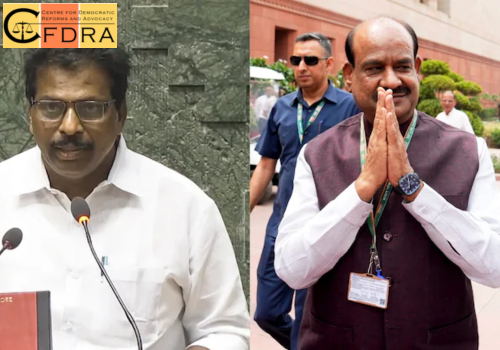Om Birla and K Suresh Contend for Lok Sabha Speaker Position

The BJP-led NDA, wielding a comfortable majority in the Lok Sabha, nominated Om Birla, a seasoned BJP MP, for the prestigious post of Speaker. Conversely, the opposition, led by the Congress, put forth K Suresh, a veteran leader with a distinguished political career.
In a pivotal development within India’s political arena, the Lok Sabha Speaker’s election has become a focal point of contention. Initially expected to proceed smoothly with bipartisan support, the process has encountered turbulence, reflecting broader disagreements between the ruling BJP-led National Democratic Alliance (NDA) and the opposition.
The discord emerged despite initial efforts to reach a consensus. Talks faltered notably when discussions on appointing the Deputy Speaker became contentious. The opposition, represented by Congress’s KC Venugopal, sought an assurance of the Deputy Speaker post in return for supporting Birla uncontested. However, the NDA declined to commit to such conditions, leading to a breakdown in negotiations.
Electoral Dynamics and NDA’s Majority
Om Birla, supported by the NDA’s substantial majority of 293 members out of 542 (excluding the vacant Wayanad seat), needs 271 votes to secure the Speaker’s position. This numerical advantage suggests Birla’s election is likely despite opposition efforts.
Opposition’s Response and TMC’s Stance
Following the breakdown of talks, the opposition, although at a numerical disadvantage, remained resolute in contesting the Speaker’s election. K Suresh’s nomination underscores the opposition’s determination to uphold its stance in parliamentary proceedings. Notably, the Trinamool Congress (TMC) expressed displeasure over not being consulted about Suresh’s nomination, highlighting internal dissent within the opposition ranks.
Controversy Over Deputy Lok Sabha Speaker’s Post
A key point of contention revolves around the Deputy Speaker’s appointment, traditionally offered to the opposition party as a gesture of parliamentary cooperation. The opposition’s insistence on securing this role became a sticking point during negotiations, ultimately contributing to the breakdown in talks.
Political Maneuvering and Parliamentary Tradition
The political maneuvering surrounding the Speaker’s election reflects deeper ideological divides and strategic calculations within India’s parliamentary framework. While the NDA emphasizes maintaining parliamentary tradition, the opposition contends that customary roles and responsibilities must be upheld to ensure balanced representation within the legislative body.
First Day of Parliament Session
The 18th Lok Sabha commenced its session amidst a charged atmosphere, marked by vocal protests and parliamentary confrontations. The opposition’s boycott of the panel to assist pro tem Speaker Bhartruhari Mahtab underscored tensions over procedural norms and precedents.
Conclusion
As India’s political landscape navigates these challenges, the outcome of the Speaker’s election will not only determine parliamentary leadership but also set precedents for future legislative sessions. The standoff highlights the intricacies of coalition politics and the delicate balance of power within India’s democratic framework.
In summary, while Om Birla’s election appears likely given the NDA’s numerical advantage, the opposition’s resilience and insistence on procedural fairness underscore the complexities of parliamentary dynamics in contemporary India. The resolution of these issues will shape the functioning of the 18th Lok Sabha and define the relationship between the ruling alliance and the opposition in the coming sessions.


